- Home
- Jennifer Niven
Becoming Clementine: A Novel Page 7
Becoming Clementine: A Novel Read online
Page 7
My eyes began fuzzing up a bit, and then they grew heavy and heavier, till I was suddenly hit with a weariness I’d never felt before. How long had it been since I’d slept?
Then I heard the captain’s words: “We need to trust someone, and we’re going to have to choose whether to trust the people we meet here or kill them.” Where was my brother? Where was Helen? I wondered if they were in France too, having to take a chance on trusting total strangers.
The next morning, Barzetti was taking his shift at the barn door, a cigarette in one hand, a gun in the other. I sat up and saw the lines of sunlight on the dirt of the floor, falling across the hay. I said, “Good morning.” Barzetti didn’t even turn around.
I said, “Where did you sleep?” The barn was empty except for the two of us.
He took a drag on his cigarette, still facing away from me. He said, “We slept in the woods and took turns keeping watch. Captain thought you could stand a night off from the forest floor.” He said this as if I’d asked for a bed of feathers and a blanket spun out of silk.
I said, “Why did you sleep outside?”
“Safer that way. Never good to be boxed in. Never give yourself just one exit.” I looked around. I only saw one way in and out. “Better to be in the open, where you have a choice which way to run.”
I stood up, brushing the hay from my uniform. I said, “Those men last night, who were they? Are they soldiers?” I thought, He may not like me, but he loves to talk. I decided to be nice to him, to try to win him over, and also get some information out of him while I was at it.
“Combat virgins. They want to be soldiers, and maybe they will be if they take the time to learn how to shoot a gun and not jump at the first fucking Nazi they see. Goddamn Frogs. They’ll lose the war for us, shooting off their mouths and their guns without waiting for the plan, for someone to show them how to hold a fucking gun. That’s not why we’re here though—not our team, at least.”
I said, “And those men, they’re part of the Resistance?” When he didn’t say anything, I said, “You’re the radio operator, right?” He didn’t answer. “I learned Morse code in WASP training.”
“That so?” He still wasn’t looking at me. “That where you learned self-defense too?”
“Yes.” I inched toward the door.
He wasn’t wearing his patch anymore, and I could see a long red line, mean as a rattlesnake, at the corner of his eye. He looked at me then and said, “I’m not going to let you fuck up this mission.” He smiled and it was the smile of a jackal.
I stared right back at him and said, “Why does your ID say ‘Claude Lessard’?”
“Christ, sister. Anything else you want to know? My shoe size? My briefs size?”
I said, “I just wanted to know what to call you.”
He took a long drag on his cigarette, his eyes on me the whole time, and then blew the smoke out of the corner of his mouth, so it rose up sideways like a mist. Never taking his eyes off me, he rummaged for something in his pocket and handed me my compass, the one they’d borrowed from me our first night.
“Barzo,” he said. And then he lifted his arm and let me pass.
NINE
The French clothing was tailored and cut in a different way than American clothing. Even the seams were different and the buttons were different. When Delphine handed me a dress, I told her I would rather have trousers. I said, “I can move faster in pants.”
She said all she had brought with her was a dress, but she searched through the chest of drawers until she found something. Afterward, I looked at myself in the old mirror that hung in the narrow farmhouse bedroom, the one where Marcel must have slept. The pants and shirt were simple but well made. The trousers were a deep, dull green-brown, the color of balsam fir, with a dark brown belt, and the shirt was green. I cinched the belt tight and rolled up the sleeves and rolled up the pant legs so I wouldn’t trip over them. Instead of my flight boots, I was wearing low-heeled shoes that felt tight on my feet, and Delphine had given me a bag like hers and a sweater in case I got cold.
“The men do not like you because they are worried for you,” she said. “They do not want the responsibility.”
“I know, but I want to help.” And find my brother. And not get left behind.
“You must blend in. You must disappear. You must not call attention to yourself because if you do, you not only risk your own life but the lives of those around you. There are things you need to know if you want to pass as French.” I hadn’t wanted to take off my uniform—Lieutenant Colonel Heflin had said to keep it on in case we were shot down, that it would entitle us to POW protection. But the uniform was muddy and torn and needed cleaning and mending, and the men said I must be inconspicuous.
She handed me an ugly brown scarf. “Wear this on your head.”
I tied the scarf over my hair.
“When you eat, you must eat with your left hand. Everyone but Americans holds their fork with the left hand. This is one of the surest ways to give yourself away. You must learn more French phrases. You should learn three phrases perfectly, with an accent so French no one will ever know you are American.” And then she went over some with me. She said each word again and again and I repeated them, and all the while I thought how funny it was that Delphine could say a word like noir, which meant “black,” and it would mean the same to both of us, but sound so different.
Finally she said, “You learn the words quickly but your accent, how do you say, interferes. You must speak with your smile, Velva Jean, and if anyone asks, you say you are an American actress who lost her French husband to the war.”
She crossed the room and picked up a basket and started handing me things out of it. “You should carry these with you.” French money, a comb, a compact, a small knife with a pearl handle, and a lipstick—Rouge Captif, which Delphine said meant Captive Red. When I pulled it out to paint my mouth, she said, “Not too bright.”
I said, “I know. Blend in.”
She said, “Oui. Yes.”
I said, “Why are you helping me?”
She shrugged. She pulled a package of cigarettes out of the basket and a box of matches. She set the basket on the floor and lit the cigarette. As she inhaled, the red end of it glowed like an eye. She said, “We are both women, and this is not just a man’s war.”
When I came downstairs, the men were gone. An old woman was wiping the table with a rag, and Henri, the boy, was sweeping the floor. Marcel stood in the doorway smoking a cigarette. He was talking to someone outside and at first I thought it might be the captain or Gravois or Barzo, but when I went to the door I could see it was an old man, maybe his father. He muttered something in French to Marcel and then squinted toward the woods.
I said, “Where did they go?”
Marcel looked at my trousers, which must have been his. “Rouen.” I heard Delphine come down the steps after me. He turned to her. “We are to get her to the Freedom Line.” He turned back to me. “Where is your uniform?”
Delphine said, “Here.” She held it out to him.
“Bury it in the woods so it will not be tracked to us.” Before I could say anything, he handed me a piece of blue cloth, pressing it into my hand. He said, “A souvenir from your captain. Tonight I will take you to the Freedom Line and they will get you out of France, but you will have this in case something happens to me.”
I opened my hand and the piece of cloth was the blue map scarf. I tied it around my neck, and then I turned to look at Delphine and Marcel and Henri and the old man and woman, who were just strangers, daring them to say something and trying not to let them see the tears I was blinking back.
An hour later we ate dinner in silence. Every now and then Marcel, Delphine, Henri, and the old couple would discuss something in French, and then they would talk to me in English, asking the simplest questions—where was I from and did I have any sisters or any brothers fighting in this war and how had I learned to fly.
After supper, Delphine helped
the old woman clear the plates, stacking them beside the small sink in the kitchen, which was nothing more than a carved-out counter along one wall. She said, “I must get back.”
I said, “You’re not staying?”
“No, I need to get home. But all will be well.” She gave me a sad little smile that was meant to cheer me on and make me feel better about being left alone with people I barely knew. She pulled her bag over her shoulder and chest so that it rested on the opposite hip, and then she kissed Marcel on both cheeks and then his daddy and his mama, Henri, and then me.
As I watched her shut the door behind her, the old man murmured something in French to his son. Marcel said to me, “He says perhaps you would like to read a book.”
The old man held something out to me, a small book, no bigger than a fried pie. As You Were, by Alexander Woollcott. A Portable Library of American Prose and Poetry Assembled for the Members of the Armed Forces and the Merchant Marine.
“Where did you get this?” I wondered if they had shot it out of the hands of an American soldier or stolen it from his pack after they had slit his throat.
Henri said, “One of the Allies sold it to me for fifty cents.” He sounded proud.
I thanked them for the meal and pushed my chair away from the table. “I think I’m going to get some fresh air.” I picked up a hunk of my unfinished bread and As You Were and the bag Delphine had given me, thinking how light it was. Everything else I owned—Mama’s Bible, the record I’d made for Darlon C. Reynolds, my Mexican guitar and mandolin—was back at Harrington in the barracks I’d shared with Helen and the Red Cross nurses.
Marcel said, “We leave in an hour. Don’t go far. Sit out back, out of sight.”
“Je le ferais.” I will.
I slipped outside and walked around the house to the back, which faced the barn. There was a stoop with two stone steps, and I sat on one and started flipping through the book. After a while my eyes adjusted to the moonlight, and I tried to concentrate on the words, tried not to be mad over being left behind by men I barely knew, like I didn’t matter, like I was something to be gotten rid of.
I read Abraham Lincoln’s second inaugural address, which talked all about the Civil War and the slavery that had to end and how there was still important work to be done. He wrote: “Let us strive on to finish the work we are in; to bind up the nation’s wounds; to care for him who shall have borne the battle, and for his widow and his orphan...”
This made me think of my brothers, but especially Johnny Clay. I’d come all this way, but I wasn’t any closer to finding him. If I let Marcel put me on this Freedom Line, which would get me out of France, what would happen to Johnny Clay then?
I turned back through the book and found a poem by Emily Dickinson. The first line read, “To fight aloud is very brave.”
To fight aloud is very brave….
I thought of Ray escaping from two or more prison camps and at least one German death camp. Then I heard Butch Dawkins’s voice in my head: I figured if my destiny wasn’t coming to me, I would go to it.
I laid the little book aside and fished in my bag for my compass. It was just one of my talismans, my good luck charms that I always carried, like the rip cord from my parachute, the one that saved my life when I jumped from the B-29, and the little flying girl carved from a dogwood tree by my friend the Wood Carver, back home on Fair Mountain.
I untied the map scarf Captain O’Connell had left for me and studied it till I could see France and not the pattern. Rouen was a dot to the northeast, sixty, seventy, maybe eighty miles away. I followed the line of the road from there to where I thought we were, based on our walk the night before, and then I held my compass steady in the palm of my hand. I waited till it gave me the direction and then I looked up toward where it was pointing. One of the things they’d taught me in the WASP was to trust my judgment and know my compass, and my judgment and my compass were both telling me what I needed to do.
I retied the scarf and stood up. I left As You Were on the steps, where I knew Marcel and the others would find it. I pulled the bag across my shoulder and chest so that it fell against my other hip. Then I started across the farmland toward the woods, just like the men must have done.
I kept to the woods at the side of the road. I stayed close to the tree line, inside the first row of trees, because I didn’t want to be spotted by anyone who might drive by, but I was careful not to go too deep into the holler. I knew from my mountains and my own woods that dark and horrible things lived in the forest.
The light from the clouds and the moon and the stars filtered through the treetops, making them glow like haints. The moon was set high in the sky, but I could see clouds in the distance. It took my eyes a while to adjust and be able to make out a path. I walked faster, tripping over a rise in the ground—maybe a root or a limb that had fallen or been cut. Or maybe a dead body. I walked even faster, tripping over this and that, my bag bumping across my chest, against my hip. I could feel the hunk of bread inside it and wondered when I would get my next meal. Would I have to kill and skin a rabbit and eat it raw?
The air was cool and the damp was rolling in from somewhere—England, I guessed, where it always seemed to be wet and misty. Along the way, I saw certain things I recognized from when Delphine was leading us to the farmhouse—a road sign, a cottage, a fence, a grove of trees. I’d learned in the WASP not to rely only on maps. I knew how to fly blind and find my way by the land and the stars. I cocked my head back now and peered up at the sky, which was half-covered in clouds. I searched until I found the North Star, the only one that never moved.
I heard a rustling to the left of me and then to the right of me. Then I heard something cranking down the road—a car, a truck, a tank? I left the tree line and slipped deeper into the woods.
The car or truck or tank—I was too far away now, too deep in the trees to see which it was—crawled past, slow as a turtle, heading in the opposite direction. I stopped moving, waiting for it to go, and finally, after what seemed like days, I heard it wind away into nothing. I crept along again, moving as fast as I could in the dark over sticks and rocks, limbs snapping me in the face.
An owl hooted. An animal rustled in the brush. Something scuffled across the forest floor.
I paused in the shade of a tree and got out my compass again. I held it flat as I could, but my hand was shaking. I made a fist and shook it, and then I opened my hand again and this time it was still. The compass ticked this way and that, finally settling on a direction.
I slipped the compass back into my pocket and strained my eyes for landmarks. Things were beginning to look the same. This house, this barn, this road sign. Was I going in circles? I’d been so sure I could find my way, but now everything was blending together. I remembered a sign on the side of the road that said “Cambremer” when Delphine had led us through. Where was it now?
The mist and the smoke were spreading across the floor of the forest and starting to reach up toward the trees, like flames. I stood still, feeling like the only person on earth, and then I got down on my knees and put my ear to the ground. I listened for the water of the rivers, which was something Granny once taught me. This came from the Cherokee in her, the part that was connected to nature in a deeper way than everyone else was. My mama’s only living brother, Uncle Turk, had the most Cherokee blood of any of Granny’s children, and he lived down by the creek bed with his Indian wife and sometimes creek-walked from one stream to another, all over the mountains, keeping one foot in the water at all times. That way, he said, he could never lose his way. He called the creeks his roads.
For a moment I couldn’t hear anything because my stomach was growling as loud as a bomber engine, like I hadn’t eaten in weeks. I closed my eyes and tried to hear past my stomach and the cry of a bird, high and shrill, and the breeze that was picking up in the trees, making them seem alive, as if they were waking up from a long nap, stretching their arms and legs and shaking the sleep off them. I half-expected t
o open my eyes and see them moving toward me, limbs held out like mummy arms, knots in the wood opening and shutting like eyes and mouths. I tried to hear past my own doubts and worries and all thoughts of Perry O’Connell, Gravois, Barzo, Ray, Coleman—Johnny Clay most of all—and I just listened to the earth. Granny and Daddy Hoyt, who had been trained by the Cherokee as a medicine man, both believed the earth could talk to you and tell you its secrets, as long as you were able to listen.
I listened a minute. Two minutes. Three minutes. I was about to give up when I heard it—a faint trickling, like a mountain stream after days without rain. Then it was a swooshing, picking up speed and power, then a rushing, a gushing, and it was more than a single stream or river I was hearing—it was three coming together to make one.
About a half mile later the air grew heavy as a blanket, the fog rolling around me till I couldn’t see ten feet in front of my nose. It was rolling toward something, as if it were being called, and there, across the road, I could see a fog bank, wide as a train crossing the tracks. I listened, but all I could hear was the rushing of water. I climbed up onto the road and started across, and I saw the sign that said “Cambremer,” which I knew was on the way to Rouen.
Suddenly, I heard the sharp burst of a rifle. Then a second shot and then another. The darkness tossed the sound around like a boomerang so that I couldn’t tell where it was coming from. I threw myself into the ditch, landing on my sore shoulder and clamping a hand over my mouth to keep from yelling out.
From somewhere, the churning chug-chug of a motor and then a single headlight, dimmed but blinding because it was the only light for miles. Then another headlight. And another. The last motor paused just above me and slightly ahead, sputtering and rattling in place, and I heard talking. It was a language I didn’t know, strange and harsh, spoken by men. Germans.
I lifted my head enough to see that it was a line of six, maybe seven German motorcycles, all with machine-gun-mounted sidecars. The last driver had his feet on the ground and was standing over the bike, scanning to the left and right and talking to the man in the sidecar. The machine gunner said something and then they started backing up the bike, the engine still idling. The driver walked it backward till they were just behind me.

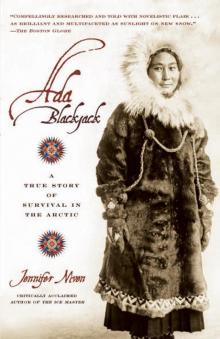 Ada Blackjack: A True Story of Survival in the Arctic
Ada Blackjack: A True Story of Survival in the Arctic The Aqua Net Diaries: Big Hair, Big Dreams, Small Town
The Aqua Net Diaries: Big Hair, Big Dreams, Small Town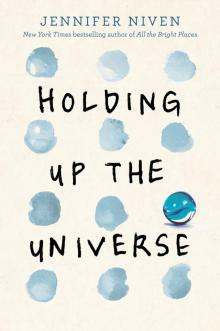 Holding Up the Universe
Holding Up the Universe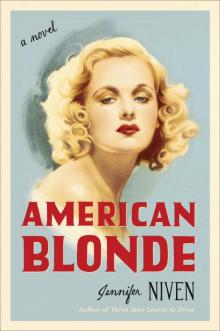 American Blonde
American Blonde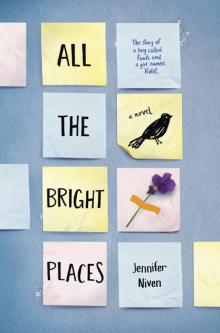 All the Bright Places
All the Bright Places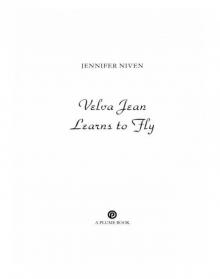 Velva Jean Learns to Fly
Velva Jean Learns to Fly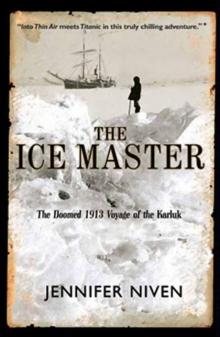 The Ice Master
The Ice Master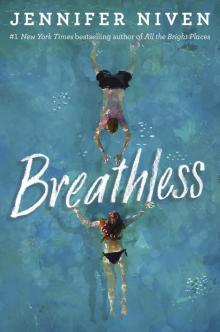 Breathless
Breathless The Aqua Net Diaries
The Aqua Net Diaries Becoming Clementine: A Novel
Becoming Clementine: A Novel